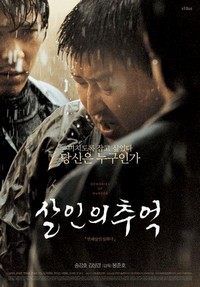
Salinui Chueok (2003)
Memories of Murder / 살인의 추억

Raiting: ![]() 8,1 /10
8,1 /10
Genre: Crime
Director: Bong Joon Ho
Stars: Song Kang-ho, Kim Sang-kyung and Kim Roi-ha
Country: South Korea
Release date: 2 May 2003
Length: 132 minutes


Raiting: ![]() 8,1 /10
8,1 /10
Genre: Crime
Director: Bong Joon Ho
Stars: Song Kang-ho, Kim Sang-kyung and Kim Roi-ha
Country: South Korea
Release date: 2 May 2003
Length: 132 minutes